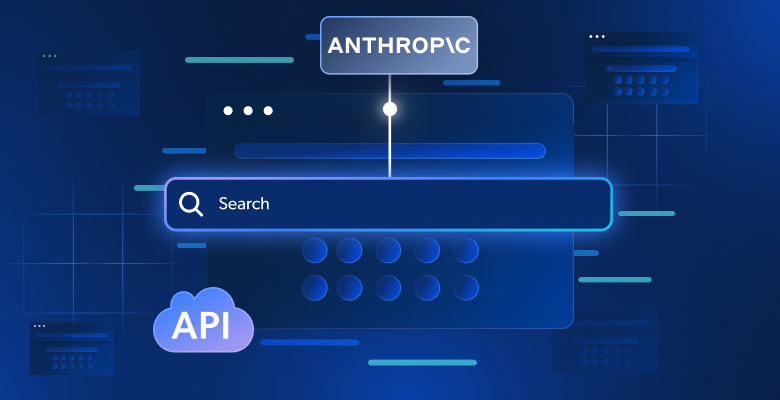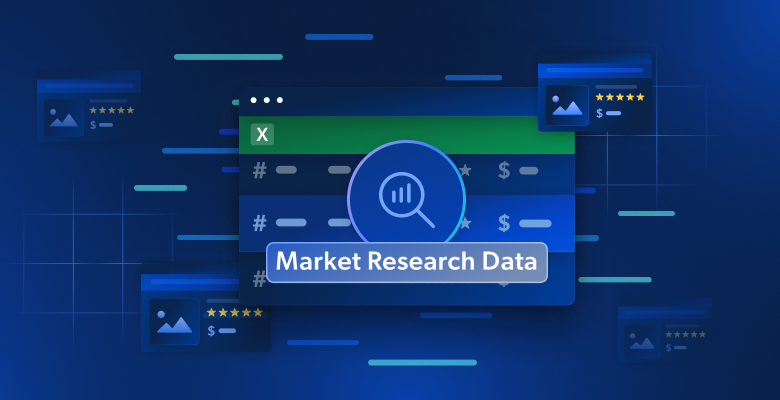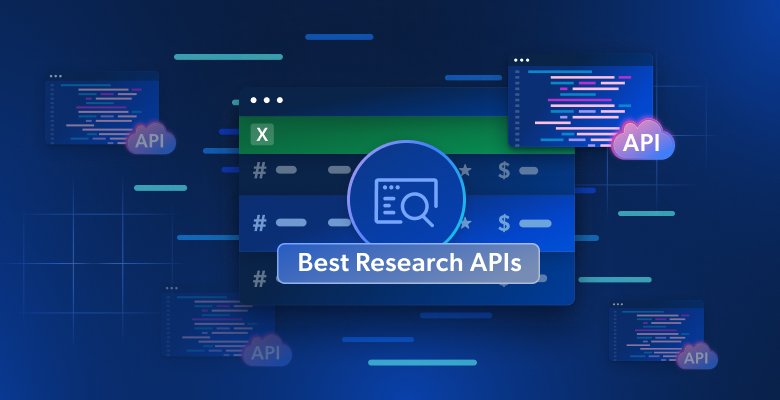In this article, you will discover:
- What Antropic web search is.
- Reasons why you should consider alternatives to it.
- Aspects to consider when evaluating its alternatives.
- The top 5 alternatives to Anthropic web search.
Let’s dive in!
Anthropic Web Search: How It Works and What It Offers

Anthropic web search is a tool that allows Claude models to access real-time information from the web. In other words, it augments Claude’s knowledge with fresh, up-to-date data. Specifically, it is a feature available on Claude models that enables them to perform web research using search engines.
Claude can determine whether it needs to search the web based on the user’s prompt. In practice, when the LLM receives a request that could benefit from web search, it uses its reasoning capabilities to decide if using the tool would yield a more accurate response. If so, it performs the search.
Below is a list of the main features offered by the Anthropic web search tool:
- Fully Claude integration: Use it in the UI or via an API call when you integrate Claude into your code.
- Reasoning trigger: Activated by Claude if needed, after a reasoning process.
- Agentic behaviour: Claude can operate agentically and conduct multiple progressive searches. To do so, it uses earlier results to inform subsequent queries. Thanks to that, it does a light research and generates a comprehensive answer. This feature can be controlled by modifying the
max_usesparameter. - Allowed and blocked domains: Specify which domains Claude can search and retrieve information from, and which it cannot.
- Localization: The API provides the
user_locationto localize search results based on a user’s location. - Citations: It always includes citations to help you in the source verification process.
Why Consider an Anthropic Web Search Alternative?
As of today, LLMs have a major downside: they can respond with outdated information. This happens because their knowledge ends at the time they were trained. Since training comes with high costs, LLM vendors can not retrain their models very frequently.
To overcome that limitation, many providers have implemented a web search option. The goal is to let an LLM search on the web for updated information after the user submits a query.
Considering how the Anthropic web search works, the reasons why you could consider an alternative are the following:
- Vendor lock-in: If you want to be free to use any LLM of your choice, then this feature may not be for you. That is because the Anthropic web search tool is specifically designed for Claude.
- Lack of control: The tool is triggered after Claude makes its reasoning on whether it should use the tool or not, based on your query. This means you have no power to decide whether to actually use it or not. It is up to Claude.
Main Factors to Consider When Evaluating Anthropic Web Search Alternatives
Several services can serve as alternatives to Anthropic web search. To navigate this landscape, it is fundamental to analyze the available solutions on specific elements, like the following:
- Features: The core capabilities and functionalities the service offers.
- Best use case: A specific application or industry where you can apply the service and gain the best benefits from it.
- Integrations: The integration capabilities, like MCP servers, APIs, or the official integrations as a third-party data provider on other platforms.
- Supported search engines: The range of search engines the service can pull results from.
- Free trial: Availability of a free plan or trial before committing to a paid subscription.
- Pricing: The provider’s pricing plans.
Best 5 Anthropic Web Search Alternatives
Let’s explore the top Anthropic web search alternatives, selected and ranked according to the criteria discussed earlier.
1. Bright Data

Bright Data is a leader in the web proxy and web data extraction industry. The company delivers a comprehensive suite of tools engineered for efficient and large-scale web data retrieval. A significant advantage of their ecosystem is the native compatibility with modern technology stacks, providing you with seamless integration into AI-powered systems, autonomous agents, and data workflows.
For tasks specifically targeting search engine data, Bright Data’s premier solution is the SERP API. This endpoint handles the complexities of scraping live, real-time results from the world’s largest search engines. It lets you collect data at scale by leveraging a collection of specialized scrapers, such as:
- Google Search API
- Bing Search API
- Yahoo Search API
- DuckDuckGo Search API
- Yandex Search API
- Naver Search API
- Baidu Search API
- And more…
In terms of data delivery, the SERP API offers significant flexibility. It can return data as well-structured, parsed JSON, or as the unprocessed raw HTML of the source page. A notable feature is the availability of an AI-ready Markdown format, which is specifically structured for ingestion in LLMs.
What is more important is that SERP API can function as a web search tool. It is available via MCP server support and offers official integrations with LlamaIndex, LangChain, Dify, Zapier, n8n, and more than 70 other platforms. Thanks to those, you create automated workflows that:
- Use the SERP API to retrieve the data upon a user query.
- Feed any LLM of your choice with the retrieved data to augment its knowledge with fresh information.
So, if you are searching for a solution that gives you the freedom to collect the data from any research engine and can feed your preferred LLM for augmenting its knowledge, then Bright Data is the one for you. Furthermore, the process is completely under your control. No limitations due to any reasoning mechanism.
It also operates on a pay-per-success model, offering both pay-as-you-go and fixed pricing plans.
Features:
- Auto-retry on failed requests.
- Built-in data validation capabilities.
- Support for synchronous and asynchronous requests.
- Only pay for successful requests.
- Code examples in cURL, Node.js, Python, PHP, and more.
- Possibility of extending data augmentation by retrieving data with other Bright Data products, like the Scraper APIs.
Best use case:
Integrations:
- Bright Data has developed its own MCP server to help you gain a wide range of possible integrations with your favourite services.
- As a 3rd-party data provider for dozens of tools, ranging across different industries like n8n, Dify, LlamaIndex, CrewAI, and many more.
Supported search engines: Google, Yahoo, DuckDuckGo, Yandex, Baidu, Naver, and others.
Free trial: Available immediately after registration.
Pricing: Starting from $1.5 for 1,000 results.
2. ChatGPT Search

ChatGPT search is an augmented search engine integrated into ChatGPT. It is available in the chat, and you can also use it via API calls. It can open specific URLs and perform research on search engines.
A standout feature it provides is a preview option. You can use it via API calls, and it helps you ensure low latency and consistent results across searches.
Note that ChatGPT comes with several integration possibilities, like the MCP server, and as a 3rd-party in several commercial tools. The pricing model depends on the version you use—the chat or the API—and on OpenAI’s model.
Features:
- A preview option to ensure low latency and consistent results.
- A reasoning feature that can determine whether to use the tool or not.
- Inline citations when presenting search results.
- Results refined based on users’ geographical position.
- The possibility of choosing a context size to control how much context is retrieved from the web.
Best use case:
- Coding and developers’ tools.
Integrations:
- The web search can be used via API calls.
- The OpenAI platform comes with its MCP server.
- As a 3rd-party in several tools like n8n, Zapier, Make, Canva, Linear, and more.
Supported search engines: Undisclosed.
Free trial:
- The chat version brings a free option, but it has limitations on context and tokens.
- The API version comes with a free tier option. OpenAI gives you some credits after registration. When you have finished them, you have to pay for new ones.
Pricing:
- The chat version starts at $20 per month.
- The API starting price is $0.25 for 1 million tokens.
3. Grounding With Google Search

Grounding with Google search is a web search tool that enables Gemini to search for fresh results on Google. You can use it either in the chat version or via API calls.
Among its features, the one that stands out is that it returns the HTML and CSS to render the required search suggestions. In other terms, when the Gemini model uses the search tool, it returns the answer and also a “search suggestions” widget, which is similar to what you see when you use the Google search bar. This shows users the search queries that the model used. See it in action in our GEO agent.
As a Google product, it uses Google to navigate the web. You can integrate Gemini with several tools and use its capabilities to create agents and workflows. Its pricing model differs from the chat and API versions, and it is also based on the model you choose.
Features:
- Returns the citations of the responses.
- Has a mechanism to decide whether to search on the web or not based on the user’s query.
- The model processes the search results and synthesizes the information before formulating a response.
- The API response contains the HTML and CSS to render the required search suggestions.
Best use case:
- Any research optimized for the Google search engine.
Integrations:
- The Google search option can be used via Gemini APIs.
- Gemini can be used as a 3rd-party integration into tools like n8n, Zapier, Make, the Google products, and more.
Supported search engines:
Free trial:
- The chat version grants a free option, but it has limitations.
- The API version offers a free tier option that lasts for 90 days, during which you can use some credits.
Pricing:
- The chat version starts at $25/Mo.
- The API version starts at $0.10 per 1 million tokens.
4. Sonar

Sonar is a search functionality that integrates into Perplexity. It can be considered the first LLM that came with an integrated web search option.
The feature that sets it apart from the others is the ability to search for information in specific locations, like the entire web, academic papers, social media, and SEC filings. This permits users to retrieve specific information. In particular, it makes it the perfect choice when searching for financial data.
On the side of integrations, Sonar capabilities can be accessed via its MCP server and APIs. It can also be used as a 3rd-party plugin in several tools such as n8n and Zapier. The pricing depends on the models and options you use. However, Sonar does not have a free tier option or free credits to start using the APIs.
Features:
- You can research using specific locations such as the entire web, academic papers, social media, and the SEC for financial filings.
- A search classifier, which is a trained model with DeepSeek R1 that determines whether a web search is necessary based on the context and content of your query.
- Filters to control which websites are included in or excluded from the search results and to manage recency dates.
- A location filter to tailor search results by incorporating users’ geographic context.
Best use case:
- Financial research.
Integrations:
- It comes with its own MCP server.
- Can be used via APIs.
- As a 3rd-party with n8n, Zapier, and others.
Supported search engines: Undisclosed.
Free trial:
- The chat version has a free version that gives you access to a wide range of features. However, it has daily limitations on the number of pro queries you can perform.
- The Sonar API does not offer free credits.
Pricing:
- The chat version pricing is related to Perplexity, which starts at $20 per month with the Pro version.
- Sonar starts at $1 per 1 million tokens.
5. Mistral web search

Mistral web search is a built-in connector tool for searching the web. What makes it stand out from its competitors is its specialization in searching for updated news. Mistral developers, in fact, have integrated the software with AFP’s newswire stories. This empowers users to receive responses enriched with factual information that adheres to the highest journalistic standards.
Mistral can be integrated via its MCP server and APIs, as well as several tools like n8n and Zapier. On the side of the pricing, they differ on the version you use—API or chat. Anyway, both come with a free tier option to let you start with it.
Features:
- Brings a complex web search tool that enables access to both a search engine and to news articles via integrated news provider verification.
- Reasoning capability that allows Mistral to decide when to activate the web search tool.
Best use case:
- News and journalism research.
Integrations:
- It comes with its MCP server.
- Mistral can be used via the APIs.
- With n8n, Zapier, and more.
Supported search engines: Undisclosed.
Free trial:
- The chat version has a free tier option that comes with limitations regarding the number of web searches, flash answers, and more.
- The API version provides you with some credits to start using it.
Pricing:
- The UI version starts at $14.99/Mo.
- The API starts at $0.4 for 1 million tokens.
Top Anthropic Web Search Alternatives: Summary Table
Compare the top Anthropic web search alternatives at a glance through the summary table below:
| Provider | Features | Best use case | Search engines | Integrations | MCP server support | API Free trial | API entry price | Pay per success |
|---|---|---|---|---|---|---|---|---|
| Bright Data | Tons | Data sugmentation for fine-tuning any LLM | Google, Yahoo, DuckDuckGo, Yandex, Baidu, Naver, others | n8n, Dify, LlamaIndex, CrewAI, Zapier, and dozen more | ✔️ | ✔️ | $1.5/1k tokens | ✔️ |
| ChatGPT Search | Some | Coding and developers’ tools | Undisclosed | n8n, Zapier, Make, Canva, Linear, and more | ✔️ | ✔️ | $0.25/1M tokens | ❌ |
| Grounding With Google Search | Some | Researches optimized for Google seach engine | 8n, Zapier, Make, all the Google products, and more | ❌ | ✔️ | $0.10/1M tokens | ❌ | |
| Sonar | Some | Financial researches | Undisclosed | n8n, Zapier, and others | ✔️ | ❌ | $1/1M tokens | ❌ |
| Mistral web search | A few | News and journalism | Undisclosed | n8n, Zapier, and more | ✔️ | ✔️ | $0.4/1M tokens | ❌ |
Applying the same criteria, this is what you would get for Anthropic web search:
| Provider | Features | Best use case | Search engines | Integrations | MCP server support | API Free trial | API entry price | Pay per success |
|---|---|---|---|---|---|---|---|---|
| Anthropic | Some | Legal research | Undisclosed | Atlassian, Zapier, Cloudflare, Intercom, Asana, Square, Sentry, PayPal, Linear, and Plaid | ✔️ | ❌ | $0.25/1M tokens | ❌ |
Conclusion
In this article, you discovered the best Anthropic web search alternatives. With so many options available, comparing them all can be costly and time-consuming. That is why, at Bright Data, we compared the top replacements for you.
Bright Data emerges as the leading alternative to the Anthropic web search tool for the following reasons:
- It allows you to augment the knowledge of any LLM you prefer thanks to its integration capabilities. This way, you are not limited to only using one LLM.
- It comes with tons of features and several related products that empower you with the possibility for maximum knowledge augmentation. In fact, it provides the best SERP and web APIs among its competitors.
- It offers a large suite of AI tools for data retrieval, searching, crawling, scraping, and much more. Thanks to this infrastructure, you can let your AI search and navigate the web freely and at scale, without limits.
- No limitations due to a reasoning mechanism. You make your API call, and it retrieves the data. And remember: you pay only if the research is successful!
Create a Bright Data account for free today and start exploring our AI-ready web search and data retrieval solutions!






